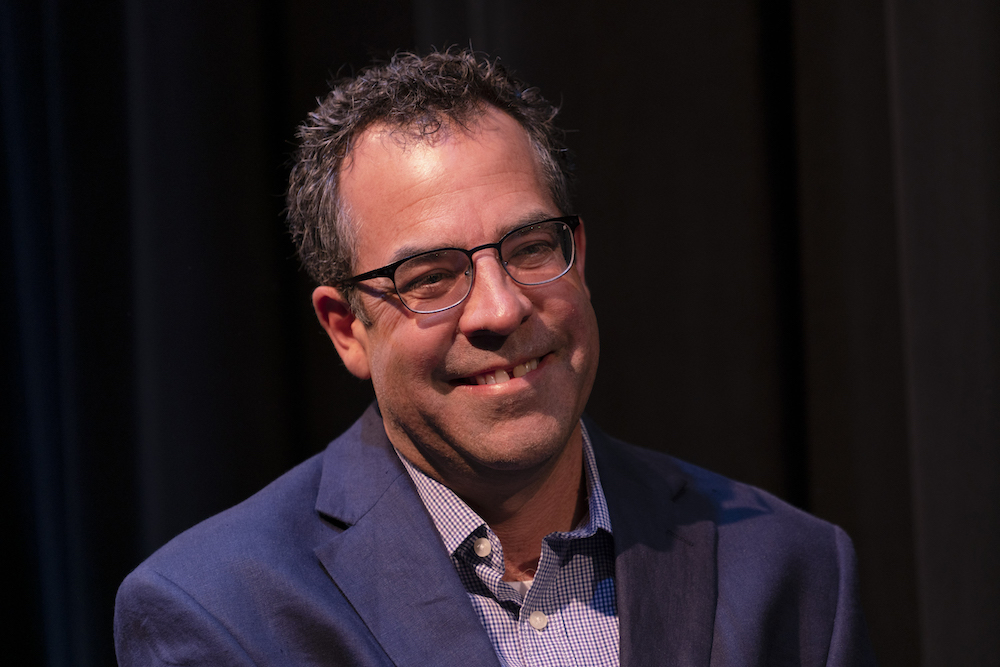
Photo by Kathleen Brennan.
Pablo Mitchell is professor of history and comparative American studies at Oberlin College. He is also the author of Coyote Nation: Sexuality, Race, and Conquest in Modernizing New Mexico, 1880-1920 and West of Sex: Making Mexican America, 1900-1930. His history textbook, Understanding Latino History: Excavating the Past, Examining the Present, was released in 2017. Before taking part in a Smithsonian/ASU “What It Means to Be American” event, titled “How Did the American Conquest of the Southwest Shape New Mexico’s Future?” he sat down in the green room and spoke about why he wants to be a sailor in his next life, the importance of walking, and what crime he would legalize.
What’s your favorite place to eat in Oberlin, Ohio?
We have a new Korean restaurant there. Not so new, but about five years old. We don’t get that many new restaurants there so when we do it’s pretty exciting.
What question do your students ask you most often?
I don’t know if they ask the same one over and over again. They tend to ask kind of factual things, that they can actually look up themselves. Like when I talk about dude ranches they say, “Where does the word dude come from?” And I say, “Oh, I don’t know,” and I go back and look it up. They could do that just as easily.
What do you miss about Albuquerque?
I’m conflicted about Albuquerque because I grew up there. So, it’s kind of love-hate. I think one of the things I kind of miss are the storms, when they come. I miss monsoon season. Clouds build up in the summertime, over the mountains during the day, and then in the late afternoon it rains really hard for about 10 or 15 minutes. Just that process of watching the clouds kind of build, I kind of miss that.
What is the biggest misconception Americans have about New Mexico?
That it’s uncomplicated. They think that they can go there and learn about it quickly. And then take those lessons back, and not have any other things that they still need to learn about it. I think it gives off this sense of simplicity.
What teacher or professor changed your life, if any?
I’m not sure if I had a teacher or professor who changed my life. I think it was more my loved ones. My family, my partner, and my kids.
What are you reading right now?
My daughter got, I think it was for my birthday last year, The Best American Essays, from 2018. I think it was Hilton Als who collected those. So on the plane I was kind reading through those. Those are really nice. It’s great for me to become a better writer by reading good writing.
What’s the best book you’ve read in the past year?
Charles Frazier has a book called Varina that I really love. I think it’s just really terrific.
If you didn’t live in the U.S., what country would you want to live in?
I might want to live in Panama. My mom’s from Panama. So maybe Panama City.
What would you do if you had one more hour in the day?
Probably walk more. I really like walking. It’s good exercise but it’s good, kind of, reflecting time. So, yeah, I might walk a little bit more.
Where do you come up with your best ideas?
A lot of times, it’s walking. So I walk around with a little piece of paper and a pen. Inspiration strikes so rarely, so when it does strike I need to be ready for that.
If you could legalize one crime, which would you choose?
That’s a good question. I think it would be crossing borders. Yeah, that would be it.
What advice do you give students who are considering going into academia?
I tell them that there might not be a lot of tenure-track jobs, but there’s still going to be a lot of jobs teaching. And that most of them are going to need a job. And the ones who are good at writing and like teaching, and who like reading—and they’re good at it [all]—should keep doing it. It’s a pretty good job. And it can be really fulfilling.
What profession would you like to practice in your next life?
I think it would be nice to be a sailor. I have no ability with boats. I’m not even a very good swimmer, but I really like water, and I like the movement of water. And I think being able to be out on the water and to do that well—hopefully well—no one imagines in their next life that they’re going to be bad at something. I’d probably be mediocre, but still it’d be nice to be a sailor.



